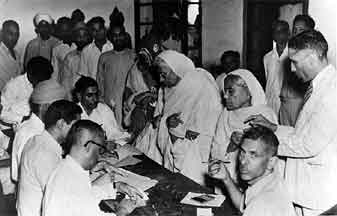1937 Indian National Congress Wins Election
In the elections for provincial assemblies, representatives of the Congress Party achieved absolute majorities in six provinces and plurality in three others. The Congress party thus faced the dilemma of whether to use the power they had won at the polls, or continue to deny the legitimacy of the process. They opted to begin governing.
In the elections of 1937 for provincial assemblies in British India, a significant milestone occurred for the Congress Party. Representatives affiliated with the Congress Party achieved absolute majorities in six provinces, while also securing a plurality in three others. This electoral success presented the Congress Party with a critical dilemma regarding the course of action to be taken.
On one hand, the Congress Party could have chosen to deny the legitimacy of the electoral process altogether. This approach would have aligned with their previous stance of challenging the British colonial rule and advocating for complete independence. By refusing to participate in the governance offered through the electoral system, they would have continued to emphasize their resistance to the British presence.
However, faced with the reality of the situation, the Congress Party leadership made a strategic decision. They recognized that by winning a significant mandate from the people, they had an opportunity to utilize the power they had gained at the polls. This presented them with a chance to influence the administration of the provinces and work towards achieving their broader goals.
Hence, the Congress Party opted to embrace the responsibility of governance and began to assume positions of power in the provinces where they had secured majorities or pluralities. This decision marked a significant shift in their approach, as they transitioned from solely advocating for independence to actively participating in the political processes offered by the British colonial regime.
By choosing to govern, the Congress Party aimed to utilize their newly acquired power to implement reforms, address social and economic issues, and advance their agenda within the confines of the existing political structure. It also allowed them to demonstrate their ability to effectively lead and govern, which could potentially strengthen their position in negotiations with the British authorities regarding the future of India.
The decision to participate in the provincial governments was not without challenges and contradictions. The Congress Party had to navigate the complexities of working within a system that they had criticized in the past. They faced the task of balancing their commitment to pushing for full independence while simultaneously governing within the existing framework.
Nonetheless, this strategic move by the Congress Party to begin governing marked an important phase in the Indian independence movement. It showcased their adaptability, pragmatism, and willingness to engage with the political processes available to them in pursuit of their broader objectives.
 >
>